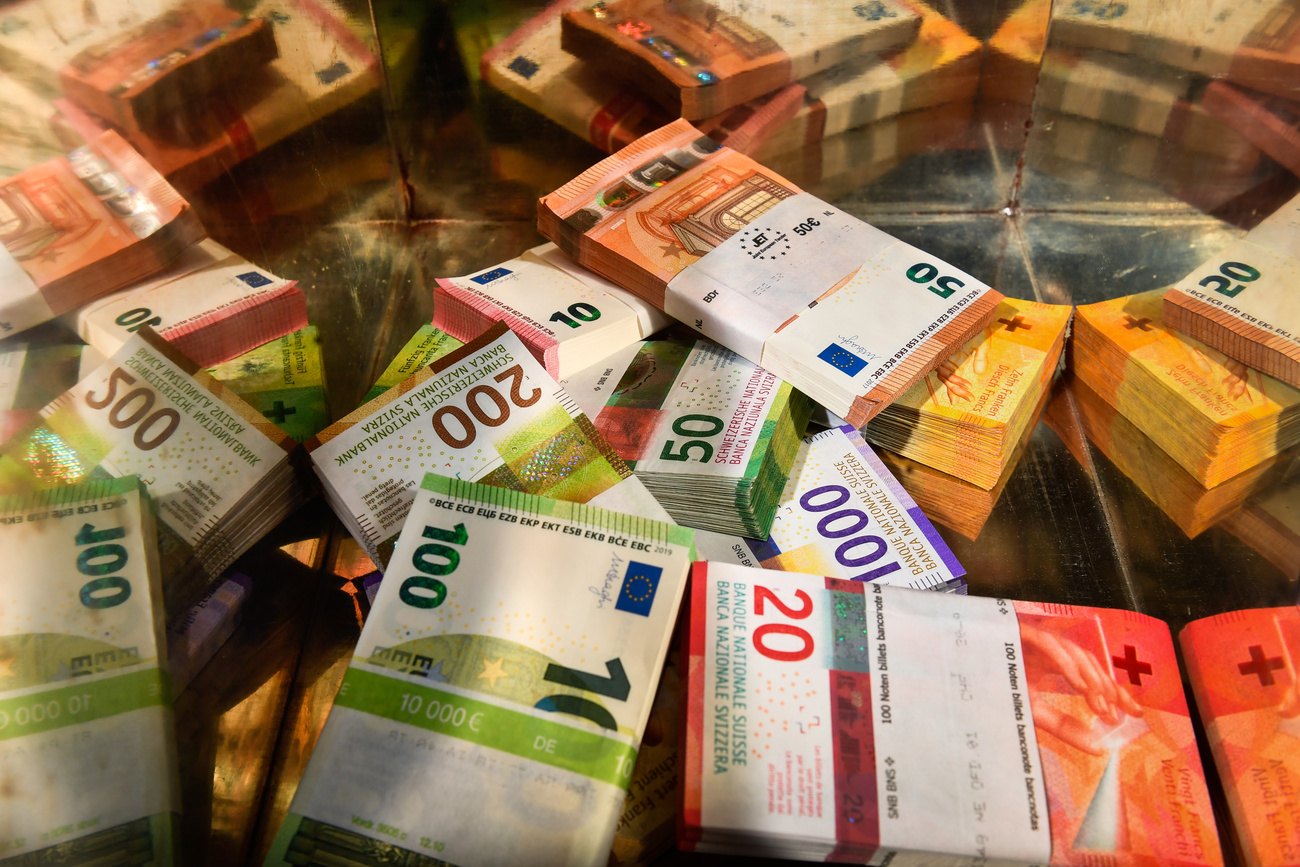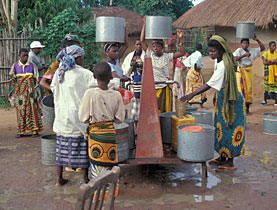Water everywhere, but not enough to drink

With so much attention fixed on global warming, terrorism and energy supply, the issue of dwindling water reserves and inequitable distribution is often overlooked.
Big business has raised eyebrows by wading into the water issue with efforts to improve the situation, in a field that has traditionally been the preserve of non-governmental organisations (NGOs).
The pressing issues surrounding water can broadly be divided into two main areas: access to clean drinking water and sanitation and the inefficient use of water by agriculture and industry.
Swiss firms, such as food giant Nestlé and agrochemicals specialist Syngenta, are increasingly taking a lead role in tackling wasteful water usage that threatens to increase global demand by an unsustainable 40 per cent in 20 years’ time.
But not everyone is happy to see big business getting involved in schemes such as the United Nations CEO Water Mandate and the World Economic Forum’s (WEF) Water Initiative.
Canadian pressure group, the Polaris Institute, used this year’s WEF meeting in Davos to condemn such “devious” initiatives for “facilitating greater control of water resources by multinational corporations while simultaneously ‘greenwashing’ socially and environmentally damaging corporate behaviour.”
To bottle or not
The UN CEO Water Mandate was quick to respond to “misrepresentations” while Nestlé has vigorously denied previous claims that it had irresponsibly taken over water supplies to produce its own bottled brands.
Speaking at the WEF meeting last month, Nestlé chairman Peter Brabeck said that bottled water accounted for just 0.0009 per cent of global supplies. “People say, where is the social responsibility selling bottled water? In Haiti, or any disaster area, how can we bring water to the people? By bottling it first,” he told swissinfo.ch.
WEF has enlisted consultancy firm McKinsey to produce a case by case study of how to improve the water efficiency of irrigation systems, construction sites and industrial enterprises in different areas.
Perhaps more controversially, Brabeck advocates a better system of pricing water to force people into becoming more conscious about how they use it.
“Germany has the highest water prices and this is where you have lowest per household consumption [in Europe]. If you have to pay almost double what you pay in other countries people will use water more efficiently,” he said.
Drinking and sanitation
Some 93 per cent of water is used in agriculture to produce the food we eat. Drinking water only accounts for a small fraction of total consumption.
The United Nations estimates that 1.1 billion people do not have access to clean water and 2.6 billion lack adequate sanitation. An estimated 5,000 children die each day from the consequences of unsanitary conditions.
The Swiss Agency for Development and Cooperation (SDC) is working with the local authorities and the private sector in mainly rural areas of developing countries to address the situation while trying to raise awareness of the problem within Switzerland.
The SDC also co-hosted a summit on water security in the Middle East, staged in Montreux in Februray. The summit attracted some 60 policy makers form the region to look at ways of better sharing scarce water resources between countries.
The Swiss Federal Institute of Technology’s aquatic research department Eawag is also striving to solve local issue in developing countries with a series of innovations.
Eawag’s projects include the development of methods to remove arsenic from water and a simple water purification system using plastic bottles and sunlight. The department won an award from the Vietnamese government last year for its work in treating water in the Asian country.
Water wars?
The problem of water shortages is becoming so severe that some people have warned that future wars could erupt over dwindling supplies.
Simon Mason, of the Center for Security Studies at Zurich’s Federal Institute of Technology, told swissinfo.ch that violent clashes over water have so far remained localised to communities in water scarce areas.
“There have been no proven case of countries going to war specifically over water supplies. It is often impossible to isolate water disputes from other grievances, but access to water – and destruction of water infrastructure – can be used as an instrument in an ongoing war,” he said.
But while a global conflict over water supplies seems far off at the moment, for many people the basic essence of life is running through their fingers.
Matthew Allen, swissinfo.ch
The total volume of water on Earth is about 1.4 billion cubic kilometres, but the volume of freshwater resources makes up only about 2.5 per cent of this total.
Some 70 per cent of freshwater comes in the form of ice in the polar caps or on permanent snow cover on mountains.
The remaining 30 per cent is stored underground, representing 97 per cent of freshwater available to humans. The remainder is available from rivers and lakes.
Humans need around five litres of drinking water a day and 20 litres to maintain minimum hygiene standards.
Agriculture comprises some 93 per cent of total human water consumption.
One kilogram of roasted coffee consumes 21,000 litres while a single apple needs 70 litres before it hits the supermarket shelves.
Industry also uses up plenty of water: It takes around 2,700 litres to produce one cotton t-shirt.
But new bio fuels are thought to be among the worst offenders for excessive water consumption. Conservative estimates maintain that 9,000 litres of water are needed to produce one litre of biodiesel.

In compliance with the JTI standards
More: SWI swissinfo.ch certified by the Journalism Trust Initiative













You can find an overview of ongoing debates with our journalists here . Please join us!
If you want to start a conversation about a topic raised in this article or want to report factual errors, email us at english@swissinfo.ch.